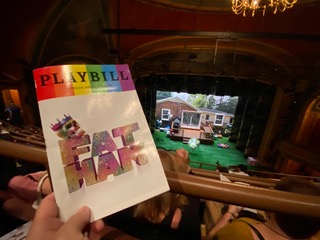Q: Why Shakespeare? (Yep—this is the question. In its entirety.)
Why not Shakespeare? (My middle school self would be patting herself on the back for this pithy retort. The grown-up me says, hold my wine….)

Shakes is the best! His plays are just good stories: solid narratives with universal themes and compelling characters. The time, place, and gender are secondary to the story, which is why productions can be set and performed by anyone anywhere at any time. Use the same language…or not. The strength of the narrative and the characters still work. The human condition hasn’t changed.
I’ve seen a lot of Shakespearian performances. From a Broadway revival of The Tempest starring Patrick Stewart amid stilt walkers and puppets to a Royal Shakespeare Company production of Henry V complete with Storm Troopers repelling from the rafters to a high school interpretation of A Midsomer’s Night Dream in a public park. They were all very different from what would have been performed during Shakes’s time, but they all worked. The story, characters, and themes carried the plays to a new audience. This is truly magical—just think how many works have been inspired from these plays.
Shakes’s The Tempest and my work, Isle of Devils, were both influenced by the same historical event: the wreck of the Sea Venture. The disappearance of the ship in 1609 was national news (in England). When the passengers and crew reappeared at James Fort in June 1610, it was as though the dead had arisen. This event fueled both imagination and fear. Shakes wove a tale involving magic and sorcery; I chose a more pragmatic, historical approach. We each have our own style of fictionalizing the event. My favorite recounting of The Tempest was Julie Taymor’s cinematic production.
I was blown away by Julie Taymor’s 2010 interpretation of The Tempest as she cast Helen Mirren in the role of Prospero. Whoa! A woman…as Prospero? But as I watched and listened, I suddenly realized that gender didn’t matter. It’s the relationship between a parent and child. Estranged relationships of perceived wrongs by family and friends. That’s the story. And I think I knew all along that men played all the parts during Shakes’s time, so why not change it up? My point in telling you is this: it gave me the freedom, as a writer, to explore other characters in Shakes’s plays through a new lens. That exploration of character is what led me to creating the character of Alice in my novel. While I strive to return women to historical narratives, I knew I had to write a female’s voice on-board the Sea Venture. It was through reading, re-reading x 100, and watching myriad Tempest productions that I found my way into this historical event. It was seeing Helen Mirren as Prospero that allowed me to question the role of women on that fateful voyage.
I know a lot of people stop listening when the name Shakespeare is mentioned. But instead of getting hung up on the language or the misplaced reverence some English teacher beat into you with regards to him, take another look. Better yet, don’t read his plays, go watch one. Experience a play. Plays were never meant to be read anyway. Let me say that again for the people in the back: plays were never meant to be read.
Start here: Shakespeare Re-Told—a 2005 BBC production modernizing four plays. I highly suggest MacBeth (with James McAvoy) and The Taming of the Shrew (with Rufus Sewell, Shirley Henderson—Moaning Myrtle to you Harry Potter fans, and Twiggy!) You won’t be sorry—and you won’t view Shakes as some pretentious, stodgy old man ever again.

